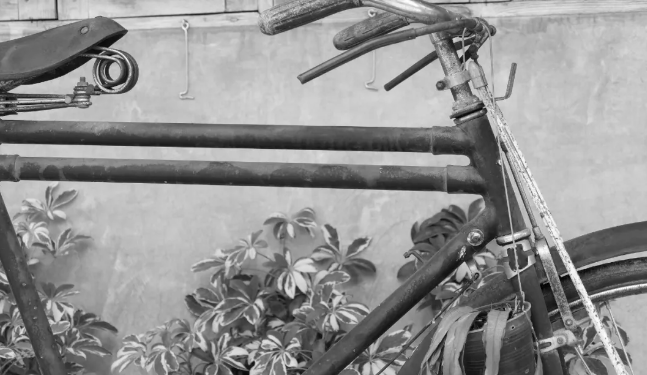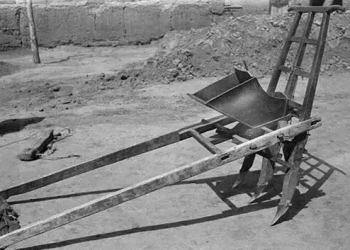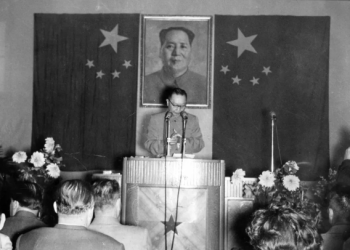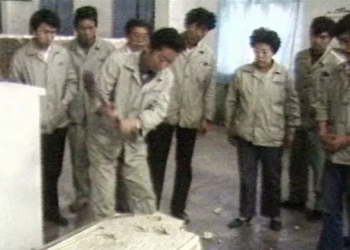In the 1970s and 1980s, the “Three Must-Have Treasures and One Sound” — a bicycle, a sewing machine, a wristwatch, and a radio — were the ultimate aspiration for many Chinese families. Owning these four iconic items would instantly elevate a household’s social status.
It took my family over a decade to collect all four.
Our very first prized possession was a “Golden Deer” brand bicycle. My father, a stonemason, often had to travel over ten kilometers into the mountains for work. The bicycle was his only means of transportation. Buying it wasn’t easy, so my father cherished it dearly. Every time he returned home, he would carefully wipe the bicycle clean and sternly remind my brother and me not to touch it. But of course, we couldn’t resist. Whenever he wasn’t paying attention, we’d sneak it out. I would hold the bike steady while my brother rode it, a pack of children following us joyfully. We were too small to sit on the seat, so we used the popular “crossbar style” of riding. Those were happy days, even though they usually ended with a good scolding from our father. On days we couldn’t take the bike out, we still found joy in it. I’d spin the pedals to make the rear wheel whirl, while my brother tossed small stones to see if they could pass through the rapidly spinning spokes — if they did, it counted as a win. Then we’d switch roles. We imagined the stones as flying arrows from an ancient battlefield, the wheel as a mighty warrior’s blade. The bike, meant for commuting, became our favorite toy. Years later, after my brother graduated from junior high and started working at a local dairy factory, our father finally bought him his own bike — nearly seven years later.
I can’t recall exactly when my father bought that first bike, but I vividly remember the day the sewing machine arrived. My mother had spent the previous day cleaning the house in anticipation. She told me, “Your uncle is coming tomorrow to help us set it up.” I had seen sewing machines before and was terrified of them as a child — I feared they might start moving on their own and hurt me. Over time, that fear turned into curiosity. Sure enough, the next day, my uncle arrived and installed our brand-new sewing machine. After he left, my mother sat in front of it, gently touching and admiring it. The machine would clothe our family of four and also help her earn a little extra by taking side jobs from the local embroidery factory. That “Panda” brand sewing machine became her most treasured possession and was used for many years.
While the sewing machine and bicycle served practical purposes, the radio and wristwatch were true luxuries.
I remember a time when the radio was airing The Story of Yue Fei. My father was completely captivated. Every day, he would take us to my aunt’s house to listen. Despite being family, it wasn’t always convenient — not for us, and especially not for her. We weren’t the only ones eager to hear the show. Her kang bed was always packed with people. Even when she wasn’t feeling well, she had to endure the noise and crowd. Eventually, my mother said to my father, “Why don’t we buy our own radio?” He asked, “With what money?” She answered, “I’ll earn it.” She began working tirelessly on the sewing machine and regularly updated us on how much she had saved and how much was still needed. My brother and I were thrilled to hear the growing numbers. After more than half a year, one afternoon after school, I heard the song Spring in the Northland playing from inside our house. I walked in and saw my mother beside a wooden-cased radio. “We got a radio,” she said. “Now we can listen to Yue Fei right here at home.” By then, of course, The Story of Yue Fei had already finished airing. Still, in an era with so few entertainment options, that “Red Star” radio brought our family irreplaceable joy. After dinner, we would all sit around it, listening to the news, comedy skits, opera, and storytelling — a soundtrack that defined my entire childhood.
The wristwatch was the final item to complete our “Three Treasures and One Sound.” My parents always said it was unnecessary, but in truth, they just couldn’t afford it. By the time nearly everyone in the village had a watch, my father finally bought his first one. Half a year later, he got one for my mother as well. Both were “Shanghai” brand watches — the only option available in local stores. The watches for my brother and me came later, after I graduated from high school. My father had a friend bring back two “Double Lion” mechanical watches from Tianjin. He told us, “Even slight movements will wind it automatically.” For a while, I wore it to bed, imagining my pulse alone kept it running. My brother was even more enthusiastic, claiming his watch could feel the Earth’s rotation. We both wore those watches for years. Mine still rests in a drawer in my study today.
From the moment my brother and I had wristwatches, our family finally completed the dream of owning all “Three Must-Have Treasures and One Sound.”











